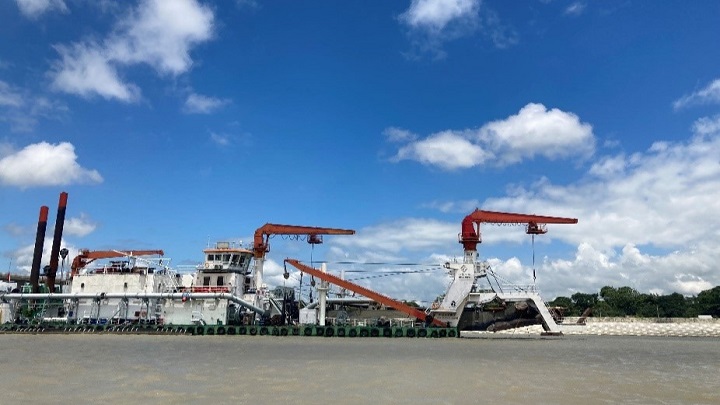Bilateral Relationships Between Bangladesh and States With Greater Power Revealed by Online-Media Analysis: Research Outcomes Shared at the ISSS-IS Annual Conference 2024
2025.02.28
From Oct. 25 to 26, 2024, the ISSS-IS Annual Conference 2024 was held at the University of Pittsburgh. This conference was jointly hosted by the International Security Studies Section of the International Studies Association and the International Security Section of the American Political Science Association. There, Research Officer Imai Natsuko , the JICA Ogata Sadako Research Institute for Peace and Development (JICA Ogata Research Institute), presented her research outcomes.

Construction work by a Chinese company progresses along the Padma, a distributary of the Ganges in Bangladesh.
The geopolitical importance of Indo-Pacific nations is increasing with the rise of China’s power. “The New Dynamics of Peace and Development in the Indo-Pacific: How Countries in the Region Proactively Interact with China ,” a research project by the JICA Ogata Research Institute that Imai participates in, focuses on the agency of Indo-Pacific nations in their foreign policies. The objective of this project is to elucidate domestic and international factors that influence bilateral relationships between Indo-Pacific nations and China. Seven countries—the Philippines, Laos, Sri Lanka, Bangladesh, Uzbekistan, Serbia and Zambia—are being studied.
The academic paper “What does the media of a smaller state say about bigger states? - Spotlighting Bangladesh’s leading online media ” is one of the so-far outcomes of the project. Imai gave a presentation based on this paper during a panel session on October 26 titled “Media & Security,” in which Jenny Oberholtzer, RAND Corporation, was the moderator and Professor Ricardo Crespo, Grossmont College, served as a discussant. Imai reported on the results of an analysis of how bilateral relationships between Bangladesh and states with greater power are discussed by Bangladeshi online media in their reports on China, Japan, the United States and India.
In this analysis, online articles were collected and statistically analyzed by text mining. The most frequently appearing words were extracted and major report headlines relevant to each bilateral relationship that included these words were identified. In addition, using the five-factor model (a model that analyzes bilateral relationships from the perspectives of domestic politics, economy, peace and security, international relations and regional relations), developed by this research project, qualitative comparative analysis was performed with these statistical results. The analysis showed that Bangladeshi media mainly reports on bilateral relationships with states with greater power, with a focus on economic issues around investment, infrastructure, manufacture and export. Furthermore, Imai shared her findings on the expectations Bangladesh has toward each of these bigger states: on China for infrastructure construction; on Japan for continuation of the long-standing bilateral relationship and for investment from the private sector; on the US to lift sanctions and open markets; and on India to enhance connectivity and solve water- and security-related issues.
In her conclusion, Imai noted the following: 1) in a smaller state, historical facts — what actions were taken by which bigger states at the time when independence was gained — are vividly etched in the memory of the people; 2) if the founding leaders of a nation had played an important role in shaping national identity, how they perceived globally powerful nations becomes a factor that the current administration must keep in mind upon formulating their own foreign policy; 3) infrastructure construction projects have significant political effects that go beyond infrastructure development; 4) the stability of the political and economic foundation of a smaller state depends largely on how it strategically views neighboring regional powers as threats, rivals or partners; and 5) the greatest interest a smaller state has in its bilateral relationships with powerful nations is in which of them would provide the most needed assistance when the country faces a major crisis or when trying to achieve its national goals.
Crespo commented on the presentation that the research method is highly unique and the perspective of trying to understand the movements of global powers from the standpoint of smaller states is excellent. He added that the outcome is thus a set of established findings. Oberholtzer pointed out that language is one of the limitations of this media study but by additionally covering local languages in the future, the work would be able to make further contributions.
Media study by Imai is looking at four countries as example cases. Surveys have been completed in Zambia and Bangladesh and are next planned to be conducted in Sri Lanka and Laos. JICA Ogata Research Institute will continue research activities that look at the perspectives of smaller states, the multifaceted nature of national interests in bilateral relationships and multi-tiered actors that are involved, while disseminating their outcomes along the way.

事業事前評価表(地球規模課題対応国際科学技術協力(SATREPS)).国際協力機構 地球環境部 . 防災第一チーム. 1.案件名.国 名: フィリピン共和国.

事業事前評価表(地球規模課題対応国際科学技術協力(SATREPS)).国際協力機構 地球環境部 . 防災第一チーム. 1.案件名.国 名: フィリピン共和国.

事業事前評価表(地球規模課題対応国際科学技術協力(SATREPS)).国際協力機構 地球環境部 . 防災第一チーム. 1.案件名.国 名: フィリピン共和国.

事業事前評価表(地球規模課題対応国際科学技術協力(SATREPS)).国際協力機構 地球環境部 . 防災第一チーム. 1.案件名.国 名: フィリピン共和国.

事業事前評価表(地球規模課題対応国際科学技術協力(SATREPS)).国際協力機構 地球環境部 . 防災第一チーム. 1.案件名.国 名: フィリピン共和国.
scroll